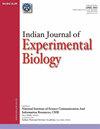杜鹃花提取物对慢性髓系白血病K562细胞的凋亡和抗增殖作用
IF 0.7
4区 生物学
Q4 BIOLOGY
引用次数: 0
摘要
荨麻(荨麻)是一种草药,因其抗癌、抗炎、镇痛、抗真菌而被广泛用作医疗补充剂。本研究分析了植物化学成分提取物对慢性髓性白血病(CML)模型细胞株K562细胞的凋亡和抗增殖作用。采用流式细胞术检测不同浓度荨麻提取物(0、25、50、75、100 mg/ml)对K562细胞增殖的影响,分析不同浓度荨麻提取物对K562细胞增殖的影响。采用LC-MS /MS法对其酚类物质含量进行分析。结果表明,杜鹃花乙醇提取物中含有咖啡酸、绿原酸(主要化合物)、苹果酸和芦丁四种酚类化合物。与从健康供者外周血中分离的对照单核细胞(PBMCs)相比,荨麻疹明显抑制K562细胞的增殖。增加Bax/Bcl-2和PARP切割比,降低线粒体膜电位,表明提取物通过凋亡介导的过程抑制细胞增殖。此外,细胞周期阻滞在G0/G1期以浓度依赖的方式增加。我们的研究结果明确表明,乙醇提取物可以降低该细胞系的细胞活力和增殖,启动细胞凋亡,诱导G0/G1细胞周期积累。本研究首次在体外实验中证实了荨麻对白血病细胞的抗增殖和凋亡作用。,,,,,,,,,,,,,,,,今天早上本文章由计算机程序翻译,如有差异,请以英文原文为准。
Apoptotic and antiproliferative effects of Urtica dioica L. extract on K562 chronic myeloid leukemia cell line
Urtica dioica (stinging nettle) is an herb commonly in use as a medical supplement for its anticarcinogenic, antiinflammatory, analgesic, antifungal . In this study, phytochemical composition extract was analyzed and its apoptotic and antiproliferative effects were investigated in K562 cell line, a model cell line for chronic myeloid leukemia (CML). K562 cells exposed to different concentrations of Urtica dioica extract (0, 25, 50, 75 and 100 mg/ml) were tested for cell proliferation and appropriate methods and different phases of the cell cycle were analyzed using flow cytometry. Phenolic content of the plant was analyzed by LC–MS/MS. We showed that Urtica dioica ethanol extract has four phenolic compounds: caffeic acid, chlorogenic acid (major compound), malic acid and rutin. Urtica dioica significantly repressed proliferation of K562 cells compared to control mononuclear cells (PBMCs) isolated from the peripheral blood of healthy donors. Increase in Bax/Bcl-2 and PARP cleavage ratio, decrease in mitochondrial membrane potential indicated that the extract inhibited cell proliferation through an apoptosis-mediated process. Furthermore, cell cycle arrest at G0/G1 phase increased in a concentration dependent manner. Our results explicitly demonstrate that ethanol extract of to decrease in cell viability and proliferation, initiate apoptosis and induces G0/G1 cell cycle accumulation in this cell line. This study is the first to show antiproliferative and apoptotic effects of Urtica dioica on leukemia cell line in vitro.
求助全文
通过发布文献求助,成功后即可免费获取论文全文。
去求助
来源期刊
CiteScore
1.57
自引率
33.30%
发文量
84
审稿时长
6 months
期刊介绍:
This journal, started in 1963, publishes full papers, notes and reviews in cell biology, molecular biology, genetic engineering, endocrinology, reproductive biology, immunology, developmental biology, comparative physiology, radiation biology, chronobiology, microbiology, pharmacology, toxicology and other biological fields including instrumentation and methodology. The papers having experimental design involving alteration and/or manipulation in biological system(s) providing insight into their functioning are considered for publication. Studies involving higher animals, human beings and of clinical nature are not encouraged for publication in the journal.

 求助内容:
求助内容: 应助结果提醒方式:
应助结果提醒方式:


